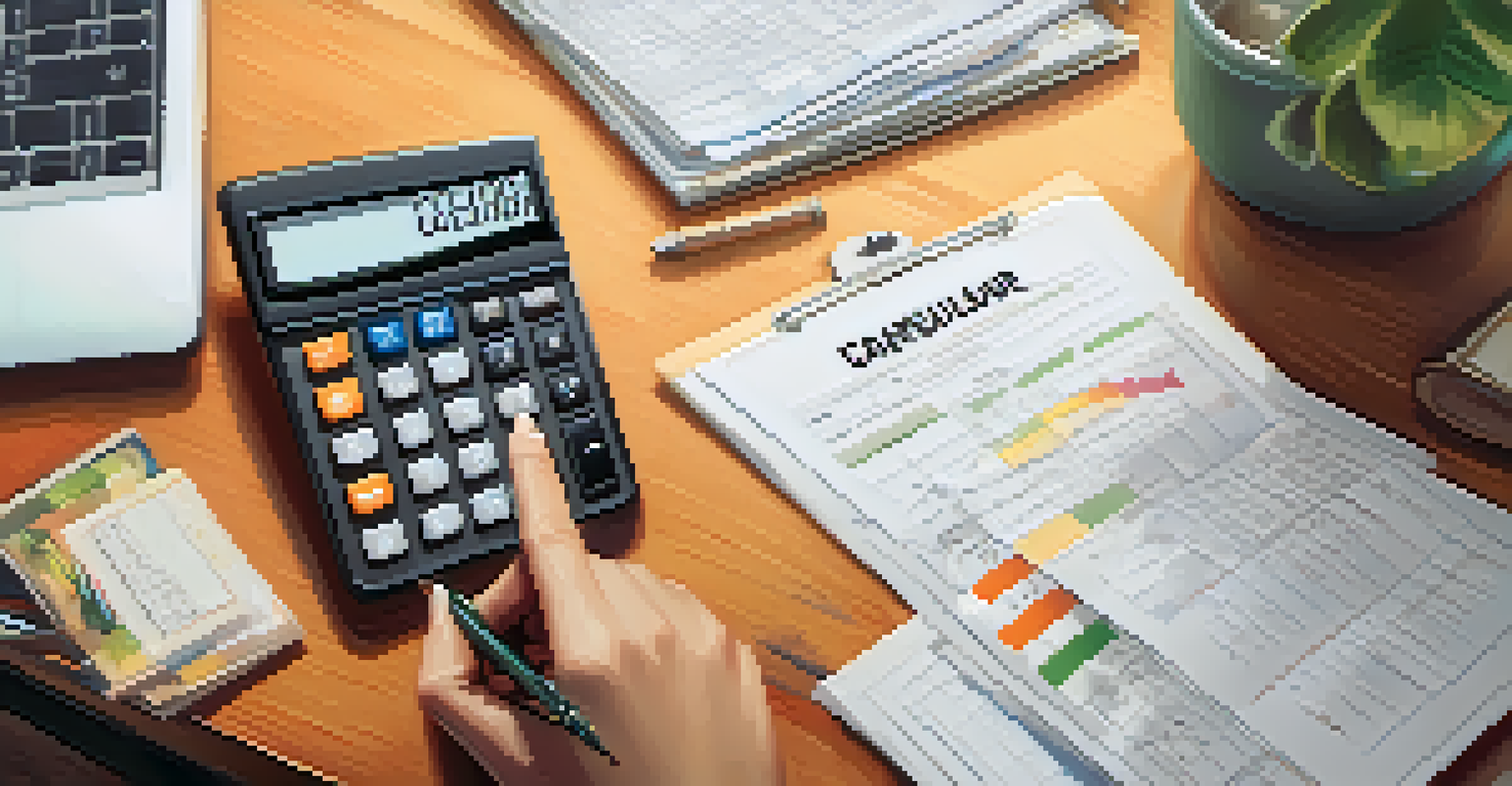Budgeting for Closing Costs: A Comprehensive Approach

Understanding Closing Costs: What You Need to Know
Closing costs are the fees and expenses you pay when finalizing a real estate transaction. These costs can include loan origination fees, title insurance, appraisal fees, and more. On average, closing costs can range from 2% to 5% of the purchase price of a home, so it's crucial to be aware of these potential expenses before you start shopping for properties.
The best time to plant a tree was twenty years ago. The second best time is now.
Many first-time homebuyers often overlook these costs, focusing solely on the down payment. However, being caught off guard by closing costs can lead to financial strain, which is why understanding them is essential. Think of closing costs as the final hurdle in a race; you need to be prepared to cross it successfully.
It's also important to remember that closing costs can vary based on location, lender, and the specifics of your loan. By educating yourself about what these costs entail, you'll be better equipped to budget effectively, ensuring you're not left scrambling at the last minute.
Estimating Your Closing Costs: Tools and Resources
To effectively budget for closing costs, start by getting an estimate. Many online calculators can help you gauge what these costs might be based on your home price and location. These tools are a great starting point, providing a ballpark figure that can help you plan your finances accordingly.

Another useful resource is your lender, who can provide a Loan Estimate form that outlines potential closing costs. This document breaks down the various fees associated with your mortgage and helps you compare offers from different lenders. It's like having a detailed map before embarking on a journey; it gives you direction and clarity.
Closing Costs: Know Before You Buy
Understanding closing costs, which can range from 2% to 5% of a home's purchase price, is crucial for budgeting effectively.
Finally, don’t forget to consider additional costs that might not be listed in the initial estimates. Home inspections, property taxes, and homeowners insurance are just a few examples of expenses that can sneak up on you. Including these in your budget will create a more comprehensive financial plan.
Negotiating Closing Costs: Tips for Homebuyers
Did you know that some closing costs can be negotiated? As a homebuyer, it's worth exploring whether you can reduce certain fees with your lender or request that the seller cover some of the costs. Think of it like haggling at a market; a little negotiation can go a long way in saving you money.
An investment in knowledge pays the best interest.
For instance, lenders may be open to waiving certain fees or providing credits if you agree to a slightly higher interest rate. This option can be advantageous if you’re looking to minimize upfront costs. Just be sure to weigh the long-term implications of a higher rate against the immediate savings.
Additionally, asking the seller to contribute to closing costs, often referred to as seller concessions, can also lighten your financial load. This approach requires good communication and a solid offer, so make sure you work closely with your real estate agent to present your case effectively.
Saving for Closing Costs: Practical Strategies
To successfully navigate closing costs, start saving early! Consider setting aside a dedicated savings account specifically for these expenses. By treating it like a bill you need to pay, you can gradually build a buffer that will help ease the financial burden when the time comes.
One effective strategy is to automate your savings. Set up a monthly transfer from your checking account to your closing costs savings account. This 'pay yourself first' approach can help you save without even thinking about it, making it easier to reach your target amount over time.
Tools for Estimating Costs
Using online calculators and Loan Estimate forms from lenders can help you gauge potential closing costs and compare offers.
Lastly, consider cutting back on non-essential expenses in your budget to boost your savings. Small sacrifices, like dining out less frequently or skipping that daily coffee run, can add up quickly. Remember, every little bit counts when it comes to accumulating funds for your closing costs.
Understanding Loan Estimates: A Key Document
The Loan Estimate is a crucial document that provides a clear breakdown of your mortgage costs, including estimated closing costs. It outlines important details like interest rates, monthly payments, and any fees associated with the loan. Understanding this document is key to making informed financial decisions during your home-buying journey.
When you receive your Loan Estimate, take the time to review it thoroughly. Look for any discrepancies or unexpected fees that might raise red flags. If something doesn’t add up, don’t hesitate to ask your lender for clarification; they’re there to help you navigate the process.
Comparing Loan Estimates from different lenders can also be beneficial. This allows you to see how various lenders stack up in terms of costs and services. By doing your homework, you can find the best deal that aligns with your financial goals.
Preparing for Closing Day: What to Expect
Closing day can feel overwhelming, but knowing what to expect can ease your anxiety. You'll be required to sign a variety of documents, including the closing disclosure, which details your final costs, and the mortgage agreement. Think of it as the final exam before graduation; being prepared will make the experience smoother.
On closing day, it’s also essential to bring the necessary funds for closing costs, typically in the form of a cashier's check. Make sure to double-check the amount required beforehand, as it can vary based on last-minute adjustments. Having the right amount ready will help avoid any last-minute stress.
Saving Strategies for Homebuyers
Setting aside dedicated savings for closing costs and automating transfers can ease the financial burden when purchasing a home.
Finally, don’t forget to conduct a final walkthrough of the property before signing any documents. This allows you to ensure everything is in order and that any agreed-upon repairs have been completed. Taking this step can help you feel confident about your new investment.
Post-Closing: Managing Your Finances
After closing day, it's essential to keep your financial health in check. With the additional responsibilities of homeownership, it's a good idea to reevaluate your budget. This includes accounting for monthly mortgage payments, property taxes, and maintenance costs that may arise unexpectedly.
Consider creating a home maintenance fund to cover future repairs and upgrades. By setting aside a small amount each month, you’ll be better prepared for any surprises that come your way. Think of it as an emergency fund specifically for your home; it can save you from financial headaches down the line.

Lastly, keep an eye on your mortgage statements and track your progress toward paying off your loan. Regularly reviewing your finances will help you stay on track and make informed decisions about your home investment. Remember, homeownership is a journey, and being proactive with your finances can make it a rewarding one.